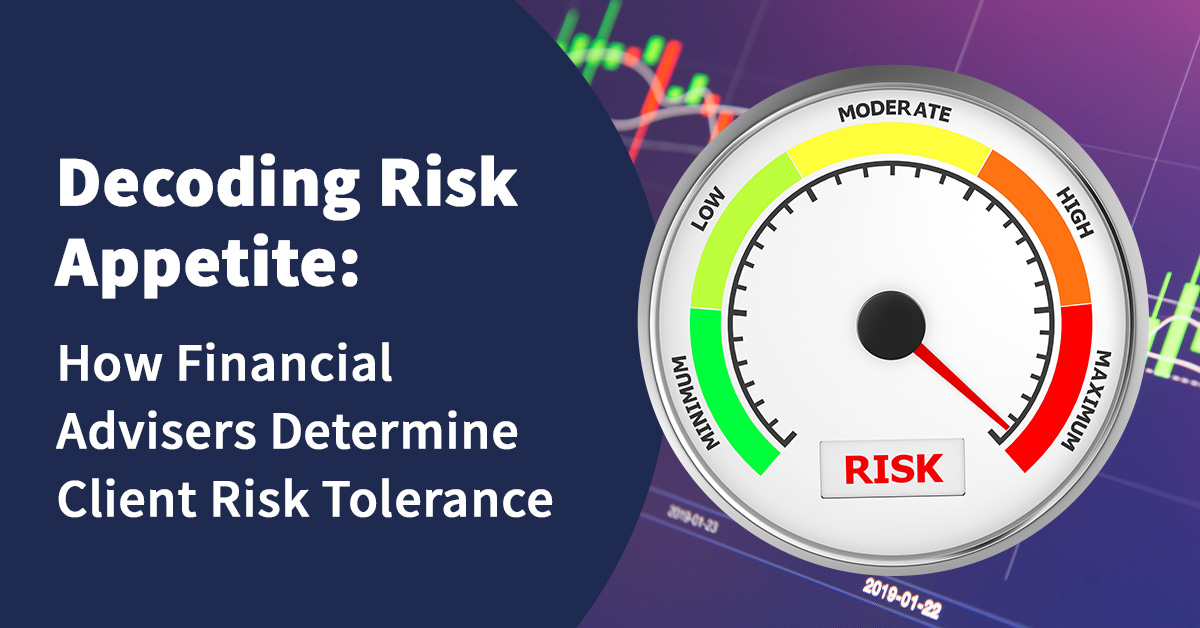One of the crucial aspects of successful financial planning is understanding an individual’s risk appetite. Risk appetite refers to an individual’s willingness and capacity to endure fluctuations in the value of their investments to achieve higher returns. Determining a client’s risk appetite is a multifaceted process that requires financial advisers to consider various factors, from personal preferences to financial goals
In this blog, we will explore the methods and considerations that financial advisers employ to assess and gauge a client’s risk appetite accurately.
- Risk Tolerance Questionnaires
One of the common tools used by financial advisers to assess a client’s risk tolerance is a risk tolerance questionnaire. These questionnaires consist of a series of carefully crafted questions designed to evaluate a client’s emotional and financial capacity for risk. The questions cover topics such as investment horizon, past experiences with investing, and attitudes towards risk and reward. Based on the responses, advisers can gauge the level of risk a client is comfortable with and recommend appropriate investment strategies.
- Investment Knowledge and Experience
A client’s investment knowledge and experience play a significant role in determining their risk appetite. Clients with a deep understanding of financial markets and investing may be more comfortable with higher-risk opportunities, while those with limited knowledge may prefer conservative, low-risk investments. Financial advisers take into account a client’s background in finance and investment to tailor their recommendations accordingly.
- Financial Goals and Time Horizon
The specific financial goals a client aims to achieve are crucial in evaluating their risk appetite. Clients with long-term goals, such as retirement planning or wealth accumulation for future generations, often have a higher capacity to endure short-term market fluctuations. Conversely, clients with short-term objectives, like saving for a down payment on a house or funding a child’s education, may prefer more conservative investments to protect their principal.
- Current Financial Situation
A client’s current financial situation, including income, expenses, debt, and existing investments, also impacts their risk appetite. Financial advisers consider a client’s overall financial stability and liquidity needs before suggesting investment strategies. Clients with significant financial commitments or limited discretionary income may prefer lower-risk investments to safeguard their financial stability.
- Emotional Factors
Emotional factors can significantly influence risk appetite. Some clients may exhibit a strong aversion to risk due to past negative experiences with investments, leading them to prefer conservative options. Others may have a higher risk appetite driven by a desire for growth and a positive outlook on the future. Financial advisers work to understand and address these emotional factors to align investment recommendations with a client’s comfort level.
- Communication and Education
The process of determining risk appetite involves effective communication and education by the financial adviser. By providing clear explanations of investment concepts, potential risks, and rewards, advisers empower clients to make informed decisions aligned with their risk tolerance. A strong client-adviser relationship built on trust and transparency fosters a better understanding of risk, leading to more successful long-term financial outcomes.
Determining a client’s risk appetite is a critical step in crafting a well-suited and personalized investment strategy.
Financial advisers use a combination of risk tolerance questionnaires, assessment of investment knowledge, consideration of financial goals, evaluation of the client’s current financial situation, and understanding emotional factors to gauge risk appetite accurately.
By taking a holistic approach and fostering open communication, advisers can help clients navigate the complexities of the financial markets while keeping their financial aspirations and comfort level at the forefront of the decision-making process.
Find out how we can help you
If you would like to understand more about this topic get in touch
Related posts
 Published On: October 16, 2024|5.4 min read|
Published On: October 16, 2024|5.4 min read|Advantages of Offshore Bonds for Non-Doms living in the UK
One of the major announcements in this year’s Spring Budget was news that the current tax regime for ‘non-domiciled’ UK residents is changing. For ‘non-doms’ out there, it’s worth understanding what changes are being introduced – and when – and the implications from a tax perspective.
Read more
 Published On: October 16, 2024|4.9 min read|
Published On: October 16, 2024|4.9 min read|Pensions planning as an expat – Is a QROPS still the right move?
More and more people are relocating for work or retirement. As a result, individuals moving overseas often prefer to transfer their UK pension benefits rather than leaving them in the UK. Likewise, those moving to the UK might want to bring their overseas pension benefits with them. Understanding the impact of such transfers is crucial.
Read more
 Published On: October 16, 2024|4.4 min read|
Published On: October 16, 2024|4.4 min read|How Offshore Bonds Can Help Non-Doms Navigate the New FIG Regime
In recent years, changes in tax regulations have significantly impacted individuals who are classified as non-domiciled residents (“non-doms”) in the UK. The introduction of the new Foreign Investment Gains (FIG) regime is one such development that has created a new set of challenges—and opportunities.
Read more









